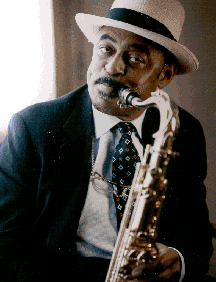 Archie Shepp, renowned jazz musician, actor, playwright, and educator, will perform at the AHA annual meeting on Friday, January 5, 2001, during the president's reception. He will be accompanied by Joe Fonda (bass), Tom McClung (piano), and Steve McCraven (drums). The performance is sponsored by Columbia University and the W.E.B. Du Bois Institute for Afro-American Research at Harvard University.
Archie Shepp, renowned jazz musician, actor, playwright, and educator, will perform at the AHA annual meeting on Friday, January 5, 2001, during the president's reception. He will be accompanied by Joe Fonda (bass), Tom McClung (piano), and Steve McCraven (drums). The performance is sponsored by Columbia University and the W.E.B. Du Bois Institute for Afro-American Research at Harvard University.
A professor of music at the University of Massachusetts at Amherst since 1973, Shepp's disparate career has taken him across several continents and has introduced him to some of the greatest figures in the history of jazz.
Music surrounded Shepp's life from an early age. Growing up in Philadelphia, he learned to play the piano, the clarinet, and the tenor, soprano, and alto saxophones, performing with R & B bands. He attended Goddard College (1955–59), where he studied drama.
Hoping to secure an acting career, Shepp set off for New York. Though he struggled to make a living as an actor, he soon found success upon returning to the passion that had driven him in Philadelphia—music. He eventually went on to tour with several bands and with his own Archie Shepp Quartet at major music festivals in the U.S., Africa, and Europe—particularly in Britain, France, and Germany.
In the sixties, Shepp had the opportunity to meet and perform with the legendary Lee Morgan, Cal Massey, Jimmy Heath, and John Coltrane. He also worked closely with Cecil Taylor, Bill Dixon, John Tchicai, and Don Cherry, co-leading their groups and touring throughout eastern Europe.
Shepp's music has been an eclectic mix of styles and harmonic structures, from jazz swing to rock to gospel. Since the early sixties, he was part of the avant-garde movement, typified by its artists' expressions of black solidarity. He stated, however, in 1965 to Down Beat magazine: "I am an anti-fascist artist. . . . My music is for the people."
Shepp revisited the theater world in the late sixties and seventies, working with trumpeter and composer Cal Massey on Lady Day: A Musical Tragedy. His own plays, including The Communist and Junebug Graduates Tonight, have also been performed in New York.
Some of Shepp's most noted recordings are New Thing at the Newport (1965, Impulse) with Bobby Hutcherson, Barre Phillips, and Joe Chambers; Yasmina/Poem for Malcolm (1965, Affinity); Montreux One (1975, Freedom); A Sea of Faces (1975, Black Saint); The Long March (1979, hat ART) with celebrated drummer Max Roach; and Trouble in Mind (1980, Steeplechase) with Horace Parlan.
Tags: Annual Meeting Annual Meeting through 2010
Comment
Please read our commenting and letters policy before submitting.






